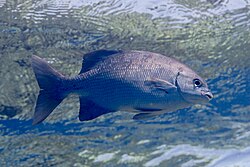From Wikipedia
Open on Wikipedia
| Kyphosus cinerascens | |
|---|---|

| |
| Kyphosus cinerascens in the Red Sea | |
| Scientific classification | |
| Kingdom: | Animalia |
| Phylum: | Chordata |
| Class: | Actinopterygii |
| Order: | Centrarchiformes |
| Family: | Kyphosidae |
| Genus: | Kyphosus |
| Species: | K. cinerascens
|
| Binomial name | |
| Kyphosus cinerascens Forsskål, 1775
| |

Kyphosus cinerascens is a species of marine ray-finned fish. It is a sea chub from the family Kyphosidae.[2][3] Kyphosus Cinerascens has 11 dorsal fins and 12 anal fins.[4] Kyphosus cinerascens are widely distributed in the Indo-Pacific region.[4] The Kyphosus cinerascens has a strict diet on phaeophytes, chlorophytes, and rhodophytes, making them herbivores.[5]
Description
[edit]An adult topsail sea chub grows up to 45 cm long and has a blue/grey, brown or black coloring.[6] They are a pale fish with dark lines that separate the rows of scales.[6]
Distribution and habitat
[edit]The species of sea chub occurs around the Indo-central Pacific and Atlantic Ocean; along several locations near the Greater Caribbean; and some areas in Brazil.[6] The sea chub is regularly found taking residence in areas of aggregations over hard algal coated bottoms of exposed, surf-swept outer reef flats, lagoons, and seaward reefs. They are commonly seen occupying depths of 24–45 m near these rocky areas.[7] Their habitats are usually seen within the Equatorial, Tropical, and Subtropical climate zones.
Diet
[edit]The sea chubs are herbivores that primarily eat phaeophytes, chlorophytes, and rhodophytes.[5]
Behavior
[edit]Sea chubs are typically more active during the day where they can be found swimming in schools of 10 or more along the reef, although at night only lone individuals can be found swimming near the sea floor.[8] They are usually found feeding on algae found on rocks and even free-floating algae particles.[8] Meanwhile, their nocturnal habits and behaviors are still unknown despite their common solitary observations.
Conservation Significance
[edit]There are five known species of Kyphosus found in Hawaiʻi, with four being from the drab genus Kyphosus and the other being the Sectator ocyurus.[9] However due to the species of Kyphosus choosing algae as their main source of food, the State of Hawaiʻi was advised to put this fish species under protective care to help restore the control of nearby algae.[9]
References
[edit]- ^ Carpenter, K.E.; Robertson, R.; Pina Amargos, F.; Curtis, M.; Knudsen, S. (2017) [errata version of 2015 assessment]. "Kyphosus cinerascens". IUCN Red List of Threatened Species. 2015 e.T46086162A115392824. doi:10.2305/IUCN.UK.2015-4.RLTS.T46086162A46664684.en. Retrieved 12 November 2022.
- ^ Froese, Rainer; Pauly, Daniel (eds.). "Kyphosus cinerascens". FishBase. December 2019 version.
- ^ Fricke, Ron; Eschmeyer, William N. & van der Laan, Richard (eds.). "Genera in the family Kyphosidae". Catalog of Fishes. California Academy of Sciences. Retrieved 25 April 2020.
- ^ a b Sakai, Keiichi (2006). "Taxonomic review of two Indo-Pacific sea chubs, Kyphosus cinerascens (Forsskal, 1775) and sydneyanus (Gunter,1886)". Ichthyological Research. doi:10.1007/s10228-006-0355-1. S2CID 25419337. Retrieved April 30, 2022.
- ^ a b Clements, K. D.; Choat, J. H. (1997-03-14). "Comparison of herbivory in the closely-related marine fish genera Girella and Kyphosus". Marine Biology. 127 (4): 579–586. doi:10.1007/s002270050048. ISSN 0025-3162. S2CID 84272086.
- ^ a b c "Shorefishes - The Fishes - Species". biogeodb.stri.si.edu. Retrieved 2023-03-26.
- ^ "Kyphosus cinerascens, Blue sea chub: fisheries". www.fishbase.se. Retrieved 2023-04-23.
- ^ a b Center (U.S.), Southwest Fisheries (1974). Collected Reprints. [National Oceanic and Atmospheric Administration], National Marine Fisheries Service, Southwest Fisheries Center.
- ^ a b Randall, John E. (2010-03-31). Shore Fishes of Hawaii: Revised Edition. University of Hawaii Press. ISBN 978-0-8248-3427-2.
